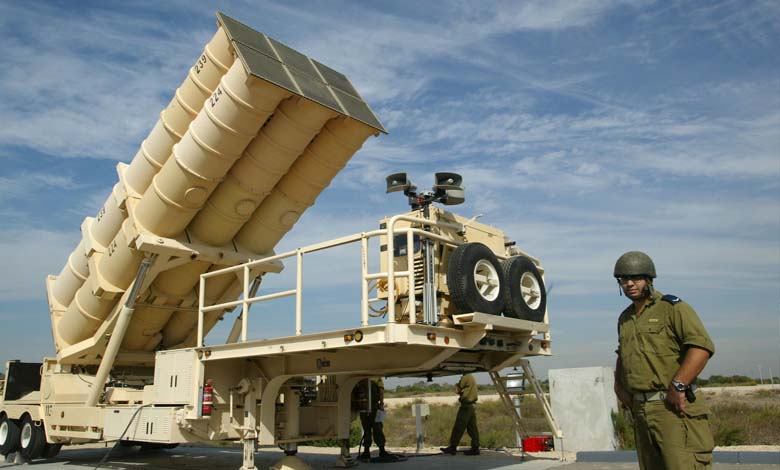Israel Faces an “Imminent Shortage” of Interceptor Missiles

The heated fronts and escalating tensions have made Israel rely on the United States to fill gaps in its air defenses.
-
One of them was a missile system commander… Israel kills Hezbollah leaders
-
Hezbollah Foils Israeli Ground Incursion Attempts
Israel is facing an imminent shortage of interceptor missiles as it works to strengthen its air defenses to protect the country from attacks by Iran and its proxies.
The United States is rushing to help fill the gaps in Israel’s protective shield, announcing on Sunday the deployment of a high-altitude air defense missile battery (THAAD), ahead of a potential retaliatory strike from Israel on Iran, which risks further regional escalation.
-
Disengagement from Gaza: Did Hezbollah accept in private what it publicly rejected?
-
Targeted by Hezbollah: What Do We Know About the Israeli Galilout Base?
A Turning Point
Dana Stroul, a former senior U.S. defense official responsible for the Middle East, considered that “the issue of Israeli munitions is serious.”
She told the British newspaper: “If Iran responds to an Israeli attack (with massive airstrikes), and Hezbollah also joins in, Israel’s air defenses will be under pressure.”
She added, “The United States cannot continue supplying both Ukraine and Israel at the same pace. We are reaching a turning point.”
-
Will Iran Abandon Hezbollah for Its Regional Interests?
-
Hezbollah and Revolutionary Guard Experts under Houthi Suspicion: New Arrangements in Yemen
24-Hour Production
Boaz Levy, CEO of Israel Aerospace Industries, a state-owned company that manufactures “Arrow” interceptor missiles used to shoot down ballistic missiles, operates on a three-shift system to keep production lines running. He spoke to the newspaper about it.
He said, “Some of our lines operate 24 hours a day, seven days a week. Our goal is to meet all of our commitments.”
He continued, “The time required to produce interceptor missiles is not a matter of days.”
While Israel does not disclose the size of its stockpiles, Levy noted that “it’s no secret that we need to replenish our stocks.”
-
Hezbollah and Revolutionary Guard Experts under Houthi Suspicion: New Arrangements in Yemen
-
Hezbollah Engages in Violent Clashes with Israeli Army near Border
In the two attacks launched by Iran on Israel in April and October this year, Israel’s air defenses, with help from the United States and other Western allies, intercepted most of the missiles and drones launched by Tehran.
Israel’s Iron Dome system also intercepted short-range rockets and drones launched by Hamas from the Gaza Strip.
Meanwhile, “David’s Sling” intercepted heavier rockets fired from Lebanon, and the “Arrow” system intercepted ballistic missiles from Iran.
-
The Role of Hashem Safi al-Din in Hezbollah: Is He Considered the Second in Command After Nasrallah?
-
The Sole Survivor of Hezbollah’s Leadership: Who Is Abou Ali Reza?
At the same time, Israel’s air defenses countered missiles, rockets, and drones launched by the Houthis against Israel.
Last April, the Israeli military stated that with the help of the United States and other allies, it achieved a 99 percent interception rate against an Iranian barrage of 170 drones, 30 cruise missiles, and 120 ballistic missiles.
However, Israel was less successful in repelling a second Iranian attack that involved more than 180 ballistic missiles fired on October 1st, according to Financial Times.
-
A $7 Million Bounty on Its Leader: What Is Hezbollah’s Most Dangerous Unit, “The Shadow Unit”?
-
Hezbollah Faces Two Choices After Nasrallah’s Assassination: Crushing Retaliation or Defeat
Nearly thirty missiles hit Israel’s Nevatim airbase, according to open-source intelligence analysts, while one missile exploded 700 meters from the headquarters of the Mossad, Israel’s foreign intelligence agency.
What about Hezbollah?
The British newspaper noted that the Lebanese Hezbollah has demonstrated that it is still capable of striking at least 60 kilometers inside Israel, despite weeks of Israeli attacks on its leaders and arsenal.
Last Sunday, a Hezbollah drone killed four Israeli soldiers at a military base in central Israel.
-
Gaza Setback and the Success of Israeli Spies: An Analysis of Hezbollah Infiltration
-
Israel Considers Ceasefire with Hezbollah While Continuing Escalation
Asaf Orion, a former Israeli brigadier general and head of strategy in the Israeli Defense Forces, told the newspaper: “We have not yet seen Hezbollah‘s full capabilities. It has only fired about a tenth of its capacity before the war, a few hundred rockets per day instead of up to 2,000.”
Orion added, “Part of this gap is Hezbollah’s choice not to fire fully, and part of it is due to the degradation by the Israeli Defense Forces. But Hezbollah has enough to launch a strong operation.”
“Haifa and northern Israel are still under attack by rockets and drones almost daily,” the brigadier general continued.
-
Can Hezbollah stand up to Israel? Iranian President expresses doubts
-
Israel Urges Lebanese Citizens to Immediately Move Away from Hezbollah Sites
According to official Israeli figures, over 20,000 rockets and shells were launched at Israel last year from Gaza and Lebanon.
“During the October 1st attack, there was a feeling that the Israeli military was conserving some of its ‘Arrow’ interceptor missiles in case Iran launched its next rockets at Tel Aviv,” said Ehud Elam, a former researcher at Israel’s Defense Ministry, who believes that “it is only a matter of time before Israel starts running out of interceptor missiles and has to prioritize their deployment.”












